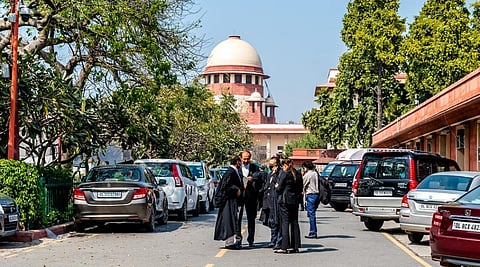

The states and Union territories (UT) must act according to the definition of ‘forest’ as laid down in the landmark TN Godavarman Thirumalpad v. Union of India judgement issued in 1996, the Supreme Court said in an interim order issued on February 19, 2024.
The apex court was hearing a public interest litigation challenging the constitutionality of the Forest (Conservation) Act. The Act was amended by the Union government in 2023.
The bench, led by Chief Justice of India DY Chandrachud and comprising of Justices JB Pardiwala and Manoj Misra, passed the order stating that the Godavarman judgement be enacted until the process of land recorded as ‘forests’ in government records is completed, legal news portal Live Law reported.
“The petitioners contended that the expansive definition of ‘forest’ given in the Godavarman judgment has been narrowed by Section 1A inserted by the 2023 amendment, according to which a land has to be either notified as a forest or specifically recorded as a forest in a government record to qualify as a “forest”. Whereas, as per the Godavarman judgment, ‘forest’ has to be understood in terms of its dictionary meaning,” the report by Live Law said.
State and UT administrations shall prepare records on forest land within a year from the notification of the 2023 amendment, as per Rule 16 of the Van (Sanrakshan Evam Samvardhan) Rules, 2023.
“Since this process is yet to be completed, the petitioners raised the apprehension of lands — which are ‘forests’ as per the Godavarman judgment — getting diverted for non-forest use in the meantime,” said Live Law.
The petitioners pointed out to the court that the new amended definition would shave off about 1.99 lakh square km of forest land from the protection accorded under the category of ‘forest’.
The court ordered:
Pending the completion of exercise by the administration of the State Governments and Union Territories, under Rule 16, the principles which are elucidated in the judgment of this court in TN Godavarman must be continued to be observed. As a matter of fact, it is evident that Rule 16 includes within its ambit forest-like areas to be identified by the expert committee, unclassed forest lands and community forest lands. In the interregnum therefore, while being guided by the provisions of the statute and those contained in Rule 16, the State Governments and UT administrations shall peremptorily ensure compliance with the ambit of expression “forest” as explained in the decision in TN Godavarman.
It further directed the Union government to issue circular to all states and UTs with reference to the above order through the Union Ministry of Environment, Forest and Climate Change.
The court has further asked the Centre to provide a comprehensive record of land registered as ‘forest’ by expert committees constituted by states and UTs as per the guidelines laid by the TN Godavarman judgment. The record has to be submitted within a period of two weeks.
“All states and UTs must comply with the directions by forwarding the reports of the expert committees by March 31, 2024. These records shall be maintained by the MoEFF and shall be duly digitised and made available on the official website by April 15, 2024,” the Live Law report noted.
It further stated: “The Expert Committees which are constituted as per Rule 16 of the 2023 Rules shall duly bear in mind the work carried out by the previous expert committees formed as per the Godavarman judgment. However, the Court clarified that the expert committees formed as per the 2023 rules will be at liberty to expand the ambit of forest lands which are worthy of protection.”
The apex court also issued directions regarding proposals on the establishment of zoos and safaris. “Any proposal for the establishment of zoo/safaris referred to in the Wild Life (Protection) Act, 1972, owned by the government or any authority in forest areas other than protected areas shall not be finally approved save and except with the prior permission of this Court,” it said.
“Where any such proposal is sought to be implemented, this Court shall be moved by the Union Government or as the case may be by the competent authority for the prior approval of the Court,” the Supreme Court added.
The directions were passed after the petitioners highlighted apprehensions about Section 5 of the Forest (Conservation) Amendment Act, 2023.
Zoos and safaris referred to in the Wild Life (Protection) Act, 1972, under the ownership of the government or any authority within forest areas, excluding protected areas, are exempted from the definition of ‘forests’, according to Section 5.
The Live Law report stated that Additional Solicitor General Aishwarya Bhati, appearing for the Union government, submitted that the amendments were passed in furtherance of the directions in the Godavarman judgment to protect forests as per the dictionary meaning.
The Centre on November 23, 2023, had submitted an undertaking to the Supreme Court that no “precipitative” steps would be taken with regards to the forest as per the dictionary sense.
Senior Advocate Prashanto Chandra Sen, appearing for some of the petitioners, referred to the zoo-safari project announced by the Haryana government in the ecologically sensitive Aravalli region. This area will not have protection of as a ‘forest area’ as per the new definition, said Sen.